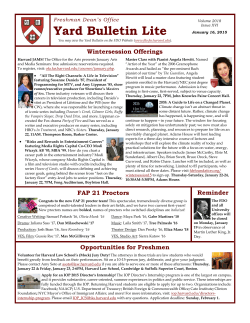
DATAVERSE FOR JOURNALS - Data Science
DATAVERSE FOR JOURNALS Mercè Crosas, Ph.D. Director of Data Science IQSS, Harvard University @mercecrosas Society for Scholarly Publishing 37th Meeting, 28, May, 2015 About Dataverse Science requires community access to data Technology Solution Open source software for publishing, citing and archiving research data ü Gives credit and control to data authors and distributors ü Follows best practices, standards for data management and archiving ü Dataverse development started in 2006 at Harvard’s IQSS ü Widely used around the world, with a vibrant development and user community ü Helped instigate and is at the center of a cultural change toward open, reproducible, and transparent research The New Dataverse Dataverse 4.0 is a full rewrite that improves usability, defines a rigorous and standardized data publishing workflow, and leverages the latest technologies. Software Features and Technology Features Technology ü Standard, persistent data citation ü Uses open source solutions ü Branding for each dataverse ü Leading-edge UI framework ü Standard, extensible metadata: ü citation metadata ü domain-specific metadata ü file-level metadata ü Faceted search for all metadata ü Multiple levels of access control ü Multiple roles and permissions ü Re-formatting of tabular data files ü Extraction of file metadata ü APIs for search, deposit, access ü PrimeFaces and Bootstrap ü Widely used, community driven enterprise software platform ü Java EE and Glassfish ü Reliable, scalable search platform ü Solr ü Web standard programmatic interfaces ü RESTful APIs ü Standards for archiving and interoperability ü OAI-PMH, LOCKSS Dataverse Repositories Installations Dataverse.org Dataverse software installations through out the world serve as: • public data repositories open to all research data (Harvard and ODUM Dataverse), • or institutional research data repositories, with data from the institution only. Harvard Dataverse • Free and open to research data worldwide • Containing: • > 1000 dataverses • > 58,000 datasets • > 270,000 files • > 1.3 million downloads • > 10,000 registered users • Includes dataverses for: • individual researchers • research teams • journals • large institutions or organizations. • Increase of about x30 deposits/month since last year Harvard Dataverse (dataverse.harvard.edu) Options for Journals and Journal Editors • Researcher Dataverse: • Authors publish a dataset in their own Dataverse • Authors provide the data citation generated by Dataverse to journal: • Journal Dataverse: • Journal has a Dataverse where authors deposit their dataset • Journal reviews and publishes the data, when ready • System Integration: • Journal management system integrated with Dataverse through the Dataverse deposit API. • Authors submit an article with the dataset in the Journal system • Dataset is automatically deposited in the Journal Dataverse Workflow for Journal Dataverses Author submits dataset Journal reviews dataset Dataset is stored as Draft in Journal Dataverse When Journal approves paper, it publishes dataset • • • • Dataset gets CC0 license by default . CC0 can be changed, if needed. Files can be restricted, if needed. Once published, dataset can’t be unpublished (only deaccessioned) • New versions can be submitted, reviewed and published. Journal Dataverses Examples American Journal of Political Science Economics: The Open-Access, OpenAssessment E-Journal Journal of Information Technology & Politics Journal of Open Psychology Data (Ubiquity Press) Data In Brief (Elsevier) Dataverse Growing Community • Software and project information: http://dataverse.org • Harvard Dataverse repository: https://dataverse.harvard.edu • Dataverse in Twitter: @dataverseorg • Dataverse community mailing list: https://groups.google.com/forum/#!forum/dataverse-community • Dataverse support: support@dataverse.org • Dataverse issue tracking: https://github.com/IQSS/dataverse • First International Dataverse Community Meeting: • June, 9, 10, 11 at Harvard University • http://projects.iq.harvard.edu/dataverse-community-meeting Other questions: @mercecrosas
© Copyright 2025












